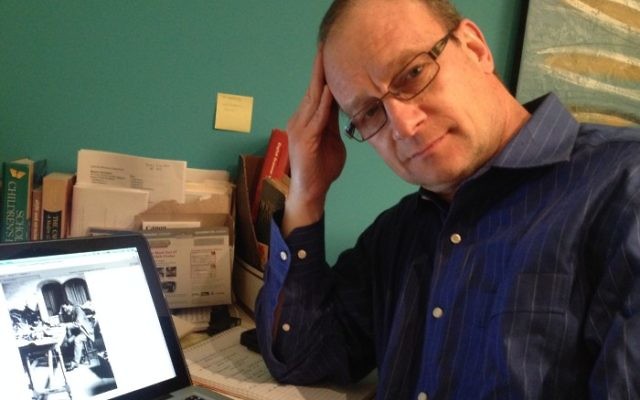‘Checking in’ with Jewish Friends
In the wake of Hamas attacks, non-Jews are reaching out to Jewish friends.
Dave Schechter is a veteran journalist whose career includes writing and producing reports from Israel and elsewhere in the Middle East.
In “The Art of Fiction,” John Gardner defined psychic distance as the “distance that the reader feels between himself and the events of the story.”
Atlanta is six thousand, four hundred miles from Israel. The psychic distance is a fraction of that.
In the aftermath of the barbaric Hamas attacks within Israel, many Jewish Americans have felt a tug toward a “Jewish homeland” that more than half have never visited. At the same time, non-Jewish friends are “checking in,” offering expressions of sympathy, of concern, of support for Israel.
A minister in Atlanta texted: “We are thinking about you and all of your family. We are horrified and heartbroken by the terrorist attacks in Israel, and for the hundreds of innocent people killed. And we are very concerned for the continued fear and threats faced by Jews everywhere. Know that we will be praying for help, safety, and comfort. And for a new path to open for reduced violence, peace, cooperation, with shared commitments for all people.”
An emeritus professor at Emory University shared an email from a colleague, “a most caring individual.” The note read: “I’m writing to express my deepest condolences for the horrible things going on in Israel. I can’t imagine how terrifying it must be. I am praying for you and your family and the people of Israel. I hope you feel our support for you during this difficult time. Please let me know if I can do anything for you and your family.”

A local Jewish artist said, “I’ve been very touched by the gestures. A non-Jewish friend called to ask how I was doing and if I wanted to take a walk with her, which I did. Then a friend of mine from high school who lives in South Carolina called out of the blue (have seen him once in 30 years) to check on me. I so appreciated his call. I was able to talk to him about a friend’s son, whose village was infiltrated by the terrorists, but he was able to get away and is safe in Jerusalem. So important to give the human/individual face to people who might not have the connections we do as Jews.”
A Jewish woman heard from a college friend, a devout Catholic, whom she has not seen in a dozen years and is in touch with infrequently. “Are you guys OK?” she was asked. “If the horror going on in Israel isn’t bad enough, I’m reading about an upsurge in anti Semitism that I was unaware of. I pray for the protection of Jews and Israel every day. I’m beyond horrified at such evil stupidity. Love you much and pray for your safety, as well.”
A 90-year-old woman from a small town in North Carolina wrote to the descendants of three Jewish families she had known as a child, in a town that now has no Jewish residents. “I am writing you because I am thinking of you and your families during this time of terror and barbarism in Israel. I don’t know really what to say except that my heart breaks and I pray for Israel’s strength and U.S. resolve. And, I pray for the safety of you and your loved ones,” was her message.
A young woman in Chicago said: “I am deeply grateful for the gesture. Many people say that they don’t really know what to say, but that is quite fine with me. To me, it is the gesture that means the most. When folks acknowledge the anti-Semitism, or the fear that we might feel, or just that they are thinking of me, to me that is a small but powerful form of ally-ship. I am not as interested in peoples’ ideologies or analyses of a complex conflict that has inflicted violence on so many people. I am much more receptive if they can sit in the grief or confusion or hurt and say that they are sending love my way. That support to me feels very palpable. And enough.”
Not everyone is as comfortable with this approach.
“My non-Jewish sister-in-law checked in with me by text, which was fine and I responded. I assumed it was because she’d seen posts saying things like ‘your Jewish friends are not okay’ or ‘the silence is deafening’ or in effect ‘if you don’t check in on your Jewish friends, what’s wrong with you?’ And like a good obedient liberal she followed up,” a woman said. “I’ve found such posts oddly bossy. I don’t expect everyone to check in with every group anything direct or indirect happens to. The only people I’ve reached out to are actual Israelis or Americans who have moved to Israel. (I don’t have family there.)”
A friend in New Jersey had mixed feelings. “A few have reached . . . But I will tell you, the silence from most — many of whose causes I’ve supported — has been deafening,” she said. “On the one hand, I appreciate it as we Jews are all connected and those were MY people who were slaughtered. On the other hand, I feel underserving because I’m not in Israel.”
I am deeply grateful for the gesture. Many people say that they don’t really know what to say, but that is quite fine with me. To me, it is the gesture that means the most. When folks acknowledge the anti-Semitism, or the fear that we might feel, or just that they are thinking of me, to me that is a small but powerful form of ally-ship.
Similarly, a woman in New York said: “I actually have many close Jewish friends who, [even] knowing I had extended family in Israel, didn’t reach out. And those who are very left, only posting feelings of outrage in response to the ‘genocide’ of the Palestinian people and referring to the Israelis as terrorists.”
An email sent to a Jewish Atlanta man by friends dating back to elementary school days read: “Our teachers always told us that human beings are superior to all other forms of life on earth. The atrocities we inflict on each other seems to indicate that human beings may be inferior to all other earthly life.”
And as the Israeli military retaliation in Gaza continues, some Jewish Americans will “check in” with friends who have ties to the Palestinian community.
For example, a Jewish woman in Atlanta messaged an Arab/Muslim friend she knows from interfaith work.
“I just don’t know what to say, except that I am praying for peace in a region that has known so little of it. My thoughts and prayers are with you and your family, with all who are grieving. Palestinians. Israelis. For loss of life on all side,” the Jewish woman texted.
Her Arab/Muslim friend replied: “Thank you, from my heart, for reaching out. I stopped listening to the news after the first couple days of violence, too much suffering and innocent lives. I feel helpless, and sad for all the lives that perished in this vicious cycle of violence. I hope you and your loved ones are safe and holding up alright.”
Indeed, the psychic distance between here and there can shrink quickly in a crisis.




comments